Unveiling true colours of Tigers
Dhaneshi YATAWARA
[email protected]
Reporting from Wanni
|
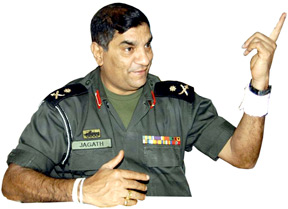
Maj. Gen. Jagath Jayasuriya, Security Forces Commander (Vanni)
|
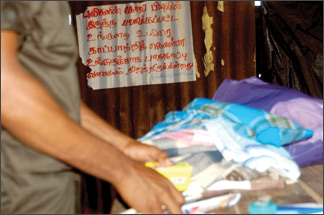
Poster calling people stranded inside uncleared areas to move
over to cleared areas |
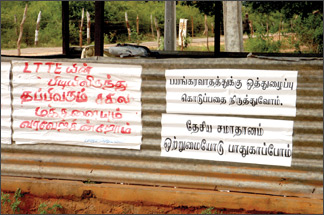
Posters highlighting people's resistance against the LTTE forced
conscription of children |
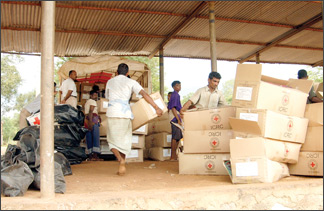
Checking at the Omanthai entry/exit point Pix - Iresha Waduge
|
On October 16 security reports flowing from Vavuniya stated that
fifty lorries carrying essential food items to Kilinochchi and
Mullaitivu returned to Vavuniya due to heavy LTTE artillery and claymore
attacks. Yet, on the other hand, the Government as the legitimate
guardian of all citizens bears no intention of preventing people living
in Kilinochchi and Mullaitivu and its vicinity from receiving all the
essential items - food as well as non food.
"Although there were few agencies who were late in dispatching their
food consignments, I categorically state that there is no shortage,
interruption or delay in supplies on the part of the Government,"
Resettlement and Disaster Relief Services Minister Rishad Bathiudeen
said last week. The provisions sent in for free distribution among the
displaced people includes cooked meals, dry rations, drinking water and
items related to health and sanitation.
While four frontiers of the approximately 120km long Wanni Forward
Defence Line are on the forward march regaining LTTE strongholds and
demolishing Tiger terrorism, the Government and the back up troops of
the Sri Lanka Army are throwing in their strongest efforts to maintain
the normality of the rest of the country as well as maintaining the
distribution of essential items to the people of the uncleared areas.
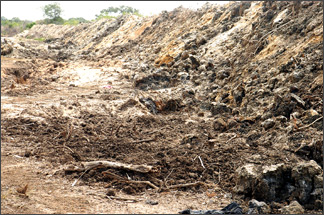
LTTE earth mound In Mannar |
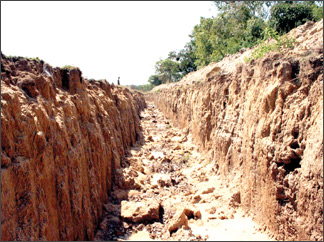
A section of a lengthy LTTE trench in Weli Oya |
As the troops move close to liberating our motherland from ruthless
Tigers, more and more forensic evidence is revealed on the destruction
of our economy, development and freedom by LTTE killers. No proper
cultivation has taken place in these areas at least in a decade except
for very few blocks which are insignificant against the estimated
population and the reported history of these areas. With the liberation
of the historical 'rice bowl' area in Mannar by the troops attached to
the 58 Division, factors emerged as hard proof against this fact. Huge
areas of dry, abandoned fallow paddy lands with no signs of a single
cultivation the recent years, dried tanks and irrigation channels filled
up with soil are heart breaking sights to a true patriotic.
While their own relatives, close friends who moved in to Colombo and
suburbs are now rich and sophisticated, these innocent Tamil, people who
were living in these areas, endured untold hardships just living on
memories of a bygone golden era.
Though successive Governments were channelling in funds, allocations
and every necessary support to develop these areas the establishment of
the Ministry of Nation Building and Estate Infrastructure Development in
2007 with the launch of Gama Neguma, Jathika Saviya, Maga Neguma,
Gemidiriya, Eastern Revival and various other development programs with
a vision and clear objectives of growth of the country was streamlined
and result oriented.
Under this ministry the number of projects, local as well as foreign,
were diverse at the cost of billions and billions of rupees. All the
districts were given a fare share with focus to the neediest to equalize
the levels of growth of all regions. It was a special responsibility of
the ministry to formulate policies, strategies and programs for
rehabilitation of these unsettled areas. Rehabilitation and resettlement
of war affected people and restoration of infrastructure facilities in
the North and East, administration of relief and humanitarian assistance
programs for displaced and resettled families, implementation of
de-mining program, supervision of foreign funded programs and
implementation of welfare facilities for civilians affected by the
ethnic war are some of the wide ranging responsibilities the ministry
has to shoulder.
The Ministry played a key role in resettling internally displaced
people in the Eastern Province while initiating formulation of short
term and medium term development plans. Workshops at National and
District level were organized to identify development potentials from
stakeholders of this development program. The ministry's Performance
Report outlines several development programs together with the
rehabilitation and reconstruction programs that are being implemented
from 2007.
47 projects
In Mannar District 47 projects are being implemented in four
Divisional Secretariats (in the cleared areas) with a total allocation
of Rs. 125 Million where all projects commenced in August 2007. Under
the Performance - 2007, Ministry of Nation Building and Estate
Infrastructure Development. Rs. 61.5 million has been allocated for the
road sector under 19 projects - 10 of these started in 2007 itself.
Two irrigation projects are implemented in Nanattan Divisional
Secretariat (in the cleared area) at a cost of Rs. 1.954 million. These
are renovations of tank and irrigation channel projects to facilitate
farming in this division.
Rs. 5.057 million has been allocated for eight projects to construct
open dug wells and water supply schemes implemented in the four
divisions.
Nine electricity projects were implemented at a cost of Rs. 32.097
million. One of the major projects has been undertaken in Madhu
Divisional secretariat at a cost of Rs. 18.7 million. Others include Rs.
0.612 million rupees for the construction of two religious buildings in
Nanattan Division - i.e. one mosque and a Hindu kovil and, Rs. 6.38
million for five construction projects of public buildings in Mannar and
Nanattan divisions.
Government could not implement specific development programs for
Vavuniya, Mullaitivu and Kilinochchi districts due to obstacles.
Under the North East Housing Reconstruction Program (NEHRP) funded by
the World Bank and the European Union facilities are given to those
vulnerable families in both North and East Provinces to reconstruct
affected and damaged houses. This program covered all eight districts of
both the provinces during the initial stages in 2005 and was limited to
cleared districts during 2006 and 2007. The project duration is from
2005 till 2010 and it covered Ampara, Batticaloa, Trincomalee, Vavuniya,
Mannar and Jaffna. Project implementation in Kilinochchi and Mullaitivu
districts were temporarily suspended during 2006 and 2007.
The total estimated cost was US$ 85.82 million. This program is a
post - conflict reconstruction initiative which is in support of the
Government's resettlement drive and this is done through cash grants to
the beneficiaries.
Since 1996 the German Technical Cooperation (GTZ), as the primary
implementing agency of the German Government for development
co-operation in Sri Lanka, supports the post-conflict rehabilitation and
reconstruction in the North and East. GTZ's main client is the German
Federal Ministry for Economic Cooperation and Development. GTZ is
implementing projects in Sri Lanka based on the Bilateral Agreements for
Technical Co-operation and the agreements between the GTZ and the
counterpart ministries. Two of these projects were implemented. The
Northern Rehabilitation Project (NRP) targeting Jaffna, Kilinochchi,
Mullaitivu, Vavuniya and Mannar districts on organizational development,
empowerment of community based organizations, support for income
generation, constructing physical infrastructure etc runs into 5.7
million euros. The other Rehabilitation of Economic, Physical and Social
Infrastructure project (REPSI) - targeted Jaffna, Mullaitivu,
Trincomalee, Batticaloa, Ampara and Hambantota. The total cost for the
program is 14.1 million euros and project duration was 2005 till 2008.
Under the North East Irrigated Agricultural Project, II (NEIAP II)
funded by the World Bank is to assist conflict affected families in the
North and East as well as adjoining districts to restore livelihoods and
enhance agricultural and other productions and income and improve
sustainable social and economic reintegration. The total estimated cost
for almost all the districts of North, East and North Central Provinces
was 8,114 million rupees since 2005 to 2010. Other than infrastructure
development of the Northern Province, district renovation and
improvements for major irrigation systems, such as giant' tank in Mannar
and Iranamadu tank in Kilinochchi, were included.
To achieve a sustainable development in agriculture in the Northern
and Eastern Provinces Pro Poor Economic Advancement and Community
Empowerment Project (PEACE) was implemented under JBIC funding from 2007
running till 2011. Under this, nine major and medium scale irrigation
tanks were scheduled to be implemented including Manamaduwa tank and
Nampan Kulam in Vavuniya and Thachchnamaruthamadu in Mannar.
These were the considerably large scale projects scheduled for the
sustainable development of the presently disturbed areas of the Northern
Province and all these projects are under continuous supervision of
Government authorities. All these projects require various kinds of
machines - from light weight vehicles to heavy machinery. But there is a
fear of vehicles being stolen by the LTTE.
Threatened relief work
A ruthless guerilla organization like the LTTE won't leave even a
Government hospital ambulance when their requirements are prioritized.
With or without the consent of INGOs and NGOs vehicles and machinery
is taken by the Tigers. This is inevitable.
"The pictures brought in by our unmanned aircraft showed that some of
those heavy machinery used to make LTTE bunds were bore the names of
some of the INGOs.
So it is obvious that belonged to those organisations, but we do not
know how they went in to Tigers' hands. These might have been forcibly
taken by the LTTE from these organisations," Security Forces Commander (Wanni)
Major General Jagath Jayasuriya told the 'Sunday Observer' when we met
him in Vavuniya.
Recognizing this threat, the Ministry of Defence requested all the
INGOs and NGOs to leave the uncleared areas and relocate in Vavuniya. At
present, all the expatriate staff have moved in to Vavuniya, but the
LTTE has not let the local staffers to leave those areas.
"Moving a step forward and being flexible in our approach we have
told the INGOs to include their expatriate staff to man their camps in
Vavuniya since they have doubts about missing their staffers. This makes
it possible for them to keep a good eye on these matters," Wanni
Commander said, further explaining the situation.
LTTE threats are imposed not only on these development activities,
but on all humanitarian relief work catering to the innocent people
displaced in Kilinochchi and Mullaitivu areas. These relief measures are
initiated by the relevant ministries hand in hand with some of the
international non governmental organizations to soften the sufferings of
displaced people.
In early October Army personnel in Vavuniya detected two vehicles
with hidden loads of explosives and batteries. Security personnel
believe that these loads which were loaded earlier, must have been left
behind due to heavy checking. The container type lorries with a load of
batteries inside a false compartment was detected as the container was
not carrying a full load. On suspicion, the security forces personnel
checked the lorry and found false compartments carrying a heavy load of
batteries. Two other lorries were later detected with false compartments
carrying motor cycle spare parts and another load of batteries of
different sizes.
Maj. Gen. Jayasuriya said it was found after thorough investigations
that many of these lorries rented to transport goods to uncleared areas
were purchased by the LTTE under different people's names using LTTE
money.
With this it becomes obvious that the LTTE is steering this pure
humanitarian effort to their self benefit. The sole saviours of the
Tamil populace misuse even the meager food stocks sent to those innocent
people trapped in adverse conditions.
"These detections cause a considerable negative impact on the
functioning of the Tigers. It definitely affects their communication
systems especially while they are operating in the jungles," Wanni
Commander explained. |
